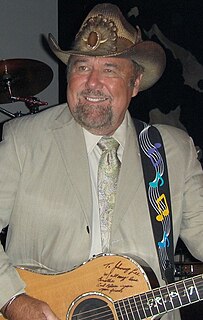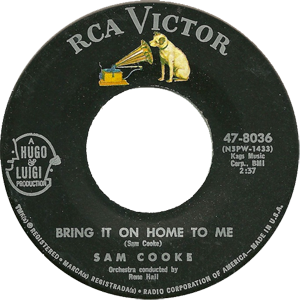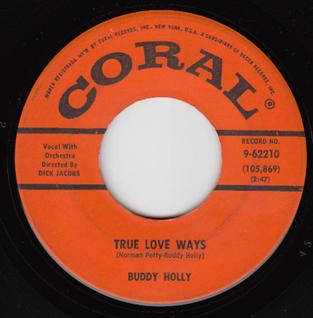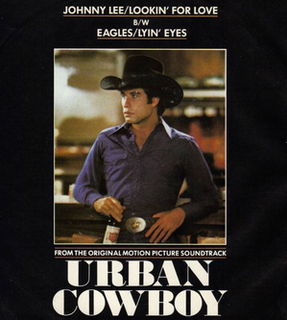Related Research Articles

"Stand by Me" is a song originally performed in 1961 by American singer-songwriter Ben E. King and written by him, along with Jerry Leiber and Mike Stoller, who together used the pseudonym Elmo Glick. According to King, the title is derived from, and was inspired by, a spiritual written by Sam Cooke and J. W. Alexander called "Stand by Me Father," recorded by the Soul Stirrers with Johnnie Taylor singing lead. The third line of the second verse of the former work derives from Psalm 46:2c/3c.
Mickey Leroy Gilley is an American country music singer and songwriter. Although he started out singing straight-up country and western material in the 1970s, he moved towards a more pop-friendly sound in the 1980s, bringing him further success on not just the country charts, but the pop charts as well. Among his biggest hits are "Room Full of Roses," "Don't the Girls All Get Prettier at Closing Time," and the remake of the Soul hit "Stand by Me". Gilley has charted 42 singles in the top 40 on the US Country chart. He is a cousin of Jerry Lee Lewis, Carl McVoy, Jim Gilley, Sonny Gilley, and Jimmy Swaggart.

Johnny Lee is an American country music singer. His 1980 single "Lookin' for Love" became a crossover hit, spending three weeks at number 1 on the Billboard country singles chart while also appearing in the top 5 on the Billboard Hot 100 chart and top 10 on Billboard's Adult Contemporary chart. He racked up 17 top 40 country hits in the early and mid-1980s.

"You Don't Know Me" is a song written by Cindy Walker based on a title and storyline given to her by Eddy Arnold in 1955. "You Don't Know Me" was first recorded by Arnold that year and released as a single on April 21, 1956 on RCA Victor. The best-selling version of the song is by Ray Charles, who took it to number 2 on the Billboard Hot 100 chart in 1962, after releasing the song on his number 1 album Modern Sounds in Country and Western Music. The first version of the song to make the Billboard charts was by Jerry Vale in 1956, peaking at number 14 on the pop chart. Arnold's version charted two months later, released as an RCA Victor single, 47-6502, backed with "The Rockin' Mockin' Bird", which reached number 10 on the Billboard country chart. Cash Box magazine, which combined all best-selling versions at one position, included a version by Carmen McRae that never appeared in the Billboard Top 100 Sides listing.

"Bring It On Home to Me" is a song by American soul singer Sam Cooke, released on May 8, 1962, by RCA Victor. Produced by Hugo & Luigi, and arranged and conducted by René Hall, the song was the B-side to "Having a Party". The song peaked at number two on Billboard's Hot R&B Sides chart, and also charted at number 13 on the Billboard Hot 100. The song has become a pop standard, covered by numerous artists of different genres. It is one of The Rock and Roll Hall of Fame's 500 Songs that Shaped Rock and Roll.

"True Love Ways" is a song attributed to Norman Petty and Buddy Holly. Buddy Holly's original was recorded with the Dick Jacobs Orchestra in October 1958, four months before the singer's death. It was first released on the posthumous album The Buddy Holly Story, Vol. 2, in March 1960. The song was first released as a single in Britain in May 1960, reaching number 25 on the UK Singles Chart. It was released the following month in the US, but did not make the charts. In 1988, a UK re-release of the recording by MCA, the single reached no. 65 on the UK singles chart in a 5 week chart run.

"Find Out Who Your Friends Are" is a song written by Casey Beathard and Ed Hill, and recorded by American country music artist Tracy Lawrence. It was the lead-off single for his album For the Love, which was released in early 2007 on Rocky Comfort Records, a label which Lawrence owns. The song was originally released to radio stations on August 21, 2006, ahead of its album release on January 30, 2007. The single did not enter the Top 40 on the Billboard Hot Country Songs chart until January 2007.

"Lookin' for Love" is a song written by Wanda Mallette, Bob Morrison and Patti Ryan, and recorded by American country music singer Johnny Lee. It was released in June 1980 as part of the soundtrack to the film Urban Cowboy, released that year. Marcy Levy was one of the female singers who provided backing vocals on the track. "Lookin' for Love" was reissued as the lead song on his October 1980 album of the same name.
"City Lights" is an American country music song written by Bill Anderson on August 27, 1957. He recorded it on a small Texas label called TNT Records in early 1958 to little acclaim. The song was first cut by Anderson in 1957 at the campus of the University of Georgia. In June 1958, Ray Price recorded it and his version hit number 1 on the Billboard Hot Country Songs singles chart in August 1958. Mickey Gilley's version also hit number 1 in June 1975.
"Room Full of Roses", written by Tim Spencer, is a song first recorded in 1949 by country music singer George Morgan. The original George Morgan version was released in the summer of 1949, and reached No. 4 on the Billboard country chart that August. A Sons of the Pioneers version reached #10 on the country charts in the same year. It was famously covered in 1974 by up-and-coming singer Mickey Gilley. The Gilley version was his first major hit and broke open his career.
"The Window Up Above" is a song written and originally recorded by American country music artist George Jones. The version recorded by Jones peaked at number #2 on the country charts and spent a total of 34 weeks on the chart. It became a #1 smash for Mickey Gilley in 1975.
"I Overlooked an Orchid" is a country song that was a hit for Mickey Gilley in 1974. It was first recorded by Carl Smith in 1950, achieving only modest sales when it was released as a single through Columbia Records. Country act Johnnie & Jack recorded the song in 1962 as part of their album Smiles and Tears, then it was released as the B-side to their single "Bye Bye Love" in early 1963.
"She's Pulling Me Back Again" is a song written by Bill Rice and Jerry Foster, and recorded by American country music artist Mickey Gilley. It was released in February 1977 as the first single from the album First Class. The song was Gilley's seventh number one on the country chart. The single stayed at number one for a single week and spent a total of thirteen weeks on the country chart.
"A Headache Tomorrow " is a song written by Chick Rains, and recorded by American country music artist Mickey Gilley. It was released in January 1981 as the second single from the album That's All That Matters to Me. The song was Gilley's eleventh number one hit on the country chart. The single stayed at number one for a single week and spent a total of twelve weeks on the country chart.
"Put Your Dreams Away" is a song written by Richard Leigh and Wayland Holyfield, and performed by American country music artist Mickey Gilley. It was released in June 1982 as the first single and title track from the album Put Your Dreams Away. The song was Gilley's fourteenth number one on the country chart. The single stayed at number one for one week and spent a total of twelve weeks on the country chart.
"That's All That Matters" is a song written by Hank Cochran, and recorded by American country artist Ray Price in 1964. It has been recorded by multiple other country artists but the most famous recording was done by American country music artist Mickey Gilley. It was released in September 1980 as the first single and partial title track from his album That's All That Matters to Me. The song was Gilley's tenth number one on the country charts. The single went to number one for one week and spent a total of eleven weeks on the country chart.
"Paradise Tonight" is a song written by Bill Kenner and Mark Wright, and recorded by American country music artists Charly McClain and Mickey Gilley. It was released in June 1983 as the second single from the album Paradise. The song was the most successful of three releases by McClain and Gilley as a duo. The single went to number one for one week and stayed a total of thirteen weeks on the top 40 country chart.
"Lonely Nights" is a song written by Keith Stegall and Stewart Harris, and recorded by American country music artist Mickey Gilley. It was released in September 1981 as the second single from the album You Don't Know Me. The song was Gilley's thirteenth number one country hit. The single stayed at number one for one week and stayed a total of thirteen weeks on the country chart.
"Fool For Your Love" is a song written by Don Singleton, and recorded by American country music artist Mickey Gilley. It was released in March 1983 as the first single and title track from the album Fool for Your Love. The song was Gilley's sixteenth number one country single as a solo artist. The single went to number one for one week and spent a total of twelve weeks on the country chart.
I-40 Country is the 29th album by Jerry Lee Lewis, released on the Mercury label in 1974.
References
- ↑ Whitburn, Joel (2004). The Billboard Book Of Top 40 Country Hits: 1944-2006, Second edition. Record Research. p. 136.
- ↑ "Mickey Gilley Chart History (Hot Country Songs)". Billboard.
- ↑ "Hot Country Songs – Year-End 1976". Billboard. Retrieved August 5, 2021.